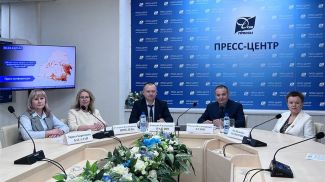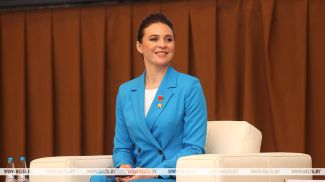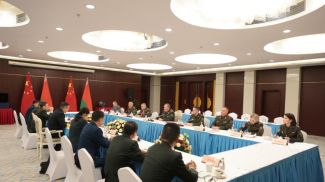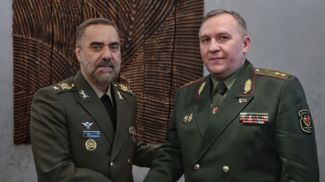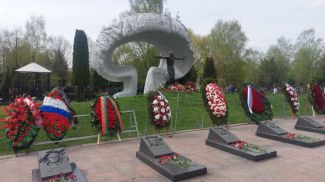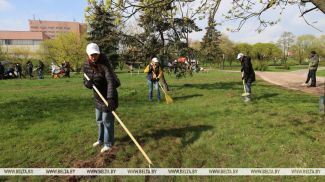KOSTYUKOVICHI, 26 March (BelTA) – Public private partnership can be implemented in powerful regions. Deputy Chairman of the Council of the Republic of the National Assembly, the national coordinator on reaching the Sustainable Development Goals Anatoly Isachenko made the statement as an offsite seminar opened in Kostyukovichi, Mogilev Oblast on 26 March to discuss investment possibilities for developing radiation-polluted territories, BelTA has learned.
The official said: “Public private partnership can be implemented in strong regions. Today in Kostyukovichi together with a UNDP team we would like to present an investment platform of the region for the sake of bringing investors for development purposes. On the one hand, the government invests in this territory. On the other hand, we enable conditions conducive to private investments here. It is an example of partnership between the government and the private sector. Today we are going to present the conditions we have.”
According to the deputy head of the upper chamber of the Belarusian parliament, Mogilev Oblast's southeast is a special region. The region was seriously affected by the accident at the Chernobyl nuclear power plant. Thanks to Belarus president decree No.235 certain conditions have been enabled for business development, preferences have been granted to allow the region to develop. Over Br1 billion and about $37 million in direct investments of private companies have been channeled into the economy of the region within the framework of the presidential decree. As a result, the duration of the decree has been extended by decree No.177, which was passed in 2020. The new decree offers unprecedented measures to support business. As a result, about 230 commercial organizations have been established in the seven districts that represent Mogilev Oblast's southeast, Anatoly Isachenko said.
“Right priorities were identified in the past. Homes are being built vigorously here since the terms are more lenient than in other parts of the oblast. The private sector grows. Huge resources are being poured into the development of healthcare. The Chernobyl program works to support the social sphere, economy, and agriculture. It produces results: people have stopped leaving, they stay, create families, build homes, and work. We try to enable all the necessary conditions for a comfortable life for them. Kostyukovichi is a good example: well-developed healthcare, there are places where people can rest and go in for sports, the private sector is developing, the local cement mill is being modernized, agriculture grows,” Anatoly Isachenko said.
According to Chairman of the Kostyukovichi District Executive Committee Aleksandr Gorbachevsky, the development of agriculture will be in focus. “We will focus on agriculture and proper farming technologies. We intend to increase harvest yields and animal husbandry productiveness. Last year we focused on developing the lands that can be used for farming after the catastrophe at the Chernobyl nuclear power plant. We will continue this work this year. It is necessary to use every bit of land,” Aleksandr Gorbachevsky noted. “I would like to say we've felt positive effect from the adoption of the regulatory acts that are in effect in our territories. We see an influx of young Belarusians and specialists. They are trying to build their homes on preferential terms and settle down in the district. We feel state assistance in agriculture, too. For instance, last year we bought 21 machines and vehicles, which allowed us to finish the sowing campaign and the harvesting campaign on time.”
For 25 years the UNDP and other UN agencies have been working in the region that has been affected by the Chernobyl nuclear power plant catastrophe and continue actively implementing projects in economy, ecology, in the sphere of provision of basic services in addition to the comprehensive national measures meant to overcome consequences of the catastrophe. UNDP Resident Representative in Belarus Alexandra Solovieva noted that the continuation of this work requires innovative solutions and tools. “The volume and the complexity of enabling conditions for living in the territories recovering from the Chernobyl catastrophe necessitates the consolidation of the potential of all partners for business development, scientific circles, residents, the government, and other interested parties,” Alexandra Solovieva stressed.
Granted by presidential decrees No.235 and No.177, special preferences are in effect in seven districts in Mogilev Oblast's southeast. A program on the social and economic development of Mogilev Oblast's southeast in the period till 2025 is being implemented. Plans have been made to build 14 water deferrization stations in Mogilev Oblast's southeast by 2025. Boiler houses will be built in Khotimsk District and Slavgorod District. There are plans to renew the fleet of school buses by spending over Br4 million on buying 34 new ones. Plans are being made to reconstruct and redecorate healthcare and education institutions, build a kindergarten, a sport and recreation complex, mini football grounds, and other things.



